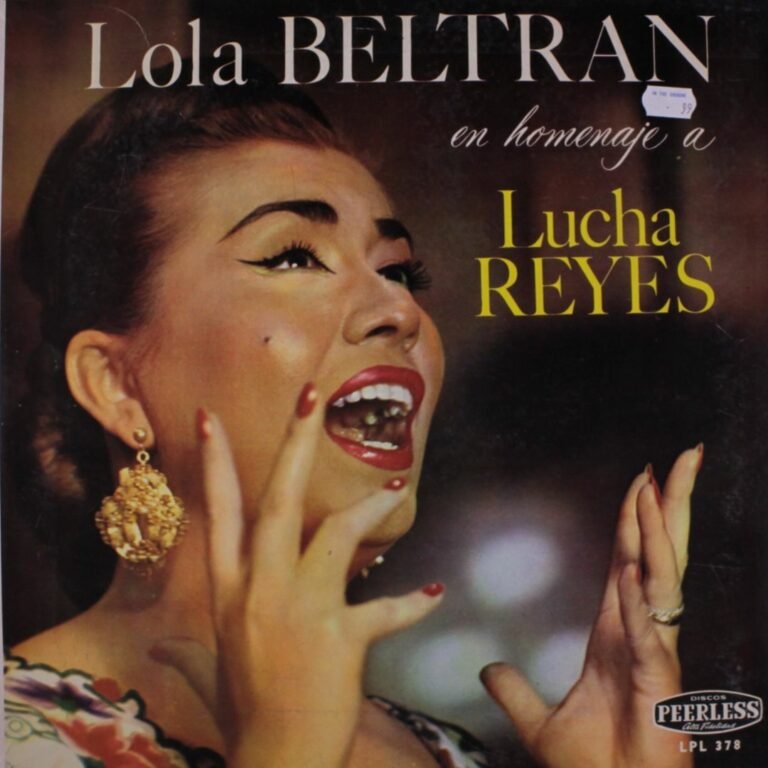Lola Beltrán, often called “La Reina del Ranchero,” is a name that resonates deeply within the hearts of music lovers, especially those who cherish the sounds of traditional Mexican ranchera music. Her voice, recognized for its powerful range and emotional depth, became the voice of an entire generation, and her contributions to Mexican culture are unparalleled. In this article, we will explore the life and legacy of Lola Beltrán, the unparalleled icon who redefined ranchera music and whose influence continues to echo through the world of Latin music.
From Rosario, Sinaloa to Mexico’s Music Stage: The Early Years of Lola Beltrán
Born Dolores Beltrán Ruiz on July 7, 1932, in Rosario, Sinaloa, Mexico, Lola Beltrán’s journey to fame was anything but easy. Raised in a rural town, she was immersed in the traditional music of Mexico from an early age. Her family, though not wealthy, supported her love for singing, and her mother, a gifted vocalist herself, encouraged Lola Beltrán to pursue her passion for music.
At a young age, Lola Beltrán began performing at local festivals and talent contests, quickly gaining attention for her incredible vocal ability. Despite the economic challenges of her early life, she was determined to make a career in music. In the 1950s, she moved to Mexico City to chase her dream. Her big break came through her performances on Mexican radio, where she first gained exposure to national audiences. It was through these appearances that Lola Beltrán’s talent began to be recognized, eventually leading her to record her first major hits.
Lola Beltrán: The Rise of a Star in Mexican Music
By the late 1950s and early 1960s, Lola Beltrán had become one of the leading voices in Mexican ranchera and mariachi music. Her rise to fame was marked by her collaboration with the iconic Mariachi Vargas de Tecalitlán, one of the most prestigious mariachi groups in Mexico. This partnership helped catapult her to stardom and introduced her to a global audience.
Her voice, rich with emotion and power, was perfectly suited for the traditional ranchera style. The genre, which deals with themes of love, heartbreak, and national pride, required not only vocal skill but the ability to convey deep emotions. Lola Beltrán excelled at both. Songs like “La Cigarra”, which tells the story of the fleeting nature of life, became her signature pieces. With her flawless delivery and the raw emotion she infused into every note, she became an instant favorite among ranchera music fans.
Throughout her career, Lola Beltrán’s music transcended borders, earning her acclaim not just in Mexico, but in Latin American countries and the United States as well. Her ability to perform emotionally-charged songs while maintaining vocal precision helped her earn the title of “La Reina del Ranchero” (The Queen of Ranchera).
The Voice of Mexico: Signature Songs that Defined Lola Beltrán‘s Career
Lola Beltrán’s catalog is filled with memorable songs that continue to define the ranchera genre to this day. Among the many tracks that marked her career, a few stand out as absolute classics that exemplify her vocal prowess and the themes that defined her work.
- “La Cigarra”: Perhaps the most iconic of Lola Beltrán‘s songs, “La Cigarra” is a ranchera that reflects on the fleeting nature of life, comparing it to the short lifespan of a cicada. Written by Mario Molina Montes, the song’s lyrics are deeply poetic, and Lola Beltrán‘s interpretation imbues it with profound sorrow and acceptance. Her performance of this song remains definitive, and it is still considered one of the greatest renditions of a ranchera ever recorded.
- “Que Bonita es Mi Tierra”: This patriotic anthem, which celebrates the beauty of Mexico, became an instant hit and further solidified Lola Beltrán as a voice of national pride. Her rendition of the song is filled with affection for her homeland, and it echoes the sentiments of millions of Mexicans who share that same love for their country.
- “La Barca de Guaymas”: A tragic and romantic ballad about lost love and longing, “La Barca de Guaymas” showcases Lola Beltrán‘s ability to convey intense emotion. Her performance of the song has been hailed as one of the most moving versions of this classic.
These songs, along with many others, helped to establish Lola Beltrán as one of the most iconic voices in Mexican music, and her interpretations of these rancheras continue to be appreciated by new generations of listeners.
Lola Beltrán: A Trailblazer for Women in Mexican Music
In a time when the music industry, especially the mariachi and ranchera scenes, was dominated by male artists, Lola Beltrán broke down barriers and emerged as one of the first women to achieve significant success in this traditionally male-dominated space. Her role as a pioneering female artist made her a trailblazer for other women in the Mexican music industry.
Her success was a clear indication that women could succeed as solo artists in the world of mariachi and ranchera, genres that were predominantly led by male performers. Lola Beltrán demonstrated that female voices could be just as powerful and expressive, paving the way for other women to follow in her footsteps.
Her influence also went beyond music. Lola Beltrán was an inspiration to countless young women across Latin America who saw in her an example of strength, independence, and success. Through her rise to fame, she proved that with determination and talent, women could make a mark in any genre, even in those that were previously dominated by men.
The Cultural Impact of Lola Beltrán: A National Treasure
Beyond her voice, Lola Beltrán became a cultural symbol of Mexico. Her image, often seen wearing traditional Mexican attire, was synonymous with Mexican pride and cultural identity. As an ambassador for ranchera music, she helped introduce the world to the rich traditions of Mexican folk music. Her performances, imbued with the themes of love for the land and the people, made her more than just a singer; she was a representative of Mexican culture.
Her songs became a part of the Mexican national consciousness, played at festivals, patriotic events, and family gatherings. Lola Beltrán‘s music was not only a reflection of the country’s emotions but also an integral part of celebrations that honored the heart of Mexico.
In her own way, Lola Beltrán became the voice of the Mexican people, especially the rural population, whose stories were often told through the ballads of ranchera music. With every performance, Lola Beltrán embodied the strength, joy, and sorrow of the nation, making her a beloved figure in Mexican culture.
The Enduring Legacy of Lola Beltrán: A Timeless Icon
Although Lola Beltrán passed away on March 24, 1996, her music lives on. Her recordings continue to be a staple in Mexican homes and on radio stations, keeping her legacy alive for new generations of listeners. Her impact on Mexican music is immeasurable, and her influence can still be felt in the work of contemporary mariachi and ranchera artists.
Lola Beltrán’s songs are still regularly performed in mariachi concerts, and her voice continues to serve as a benchmark for vocalists in the genre. The emotional depth and passion she brought to her music have set the standard for generations of ranchera singers who strive to capture that same intensity in their own work.
Moreover, Lola Beltrán’s pioneering role as a woman in a male-dominated industry remains a source of inspiration for young female artists today, both in Mexico and beyond. She proved that with talent, perseverance, and passion, women could take center stage and dominate in any genre.
Conclusion: Lola Beltrán’s Timeless Voice Lives On
In conclusion, Lola Beltrán remains one of Mexico’s most iconic and cherished musical figures. Her voice, which was both powerful and deeply expressive, helped define the ranchera genre and solidified her as one of the most beloved artists in Latin music history. Her impact on the industry, particularly as a female artist in a male-dominated genre, continues to resonate with musicians and fans alike.
Her songs, such as “La Cigarra”, “La Barca de Guaymas”, and “Que Bonita es Mi Tierra”, continue to be celebrated as masterpieces of Mexican music. As the Queen of Ranchera, Lola Beltrán not only shaped the sound of Mexico but also became a cultural symbol whose legacy lives on in the hearts of millions.
Today, Lola Beltrán is not just remembered for her voice but for the way she connected deeply with her audience, expressing the joys and sorrows of the Mexican soul. Her music will forever be a cornerstone of Mexican musical heritage, and her voice will continue to inspire for generations to come.


